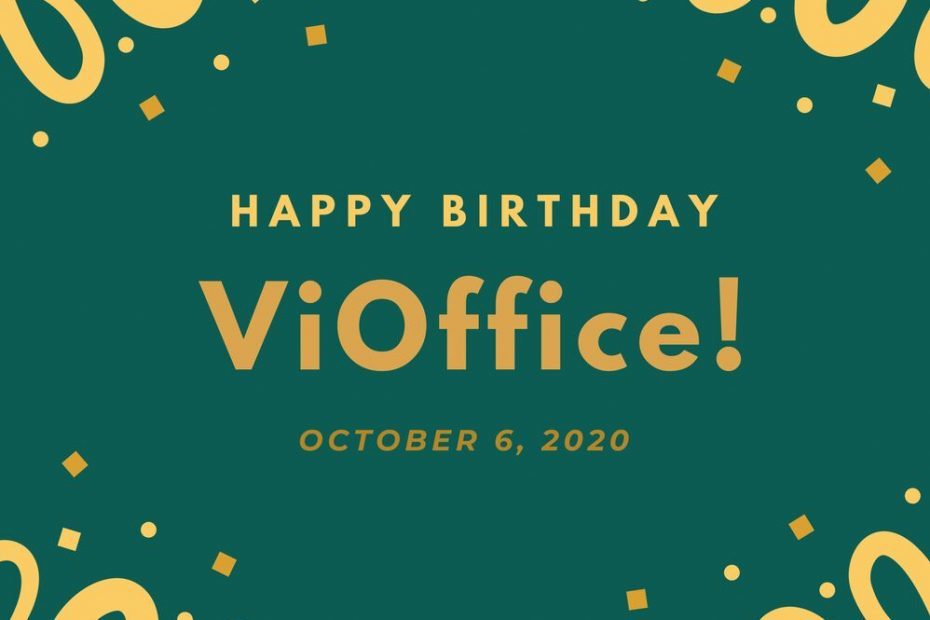Exactly one year ago, on October 06, 2020, we officially presented ViOffice to the public. What started as an evening idea in a student flat-share is now a growing start-up in the Trier IT scene. We were allowed to experience a lot of new things this year, which we would like to share with you. In this blog article we recap our founding year, tell you openly about our experiences and simply say ‘Thank you!’ for your support. At the end of the article there is also information about a small gift in the founding month as a thank you to you.
The Evening in the shared Student Flat

March 22, 2020 marks a break for Germany. On this Sunday, the federal and state governments agreed on comprehensive restrictions of social contacts in the context of the ongoing Corona pandemic – the first ‘lockdown’ was decided. While a ‘Corona fatigue’ later spread through the population, for us personally (Jan and Pascal, founders of ViOffice) it was initially a time of coming to rest from the usual everyday stress. At the same time, it became clear that companies and public authorities in Germany had missed out on digitalization for a long time and that quick solutions were now needed. Since we had discussed political and social issues frequently in our flat, we also talked about critical topics in the process, such as the influence of large tech corporations, data protection, privacy and free, open source software. From one of these conversations during the lockdown, we came up with the idea of offering our own tool for video conferencing based on Free Software, hosted in Germany and complying with the highest data protection and privacy standards (What is Free Software?). In the course of the evening, we expanded this idea by considering which features could also be needed for the home office – the idea of ViOffice was born.
From the Idea to the Startup

The evening idea remained and so we started promptly with the technical implementation and informed ourselves about how to found a company at all. In the following, we will try to briefly outline the founding process:
- Founding idea
- Research for technical implementation
On the one hand, we had to find out which free software exists to offer a comprehensive and user-friendly home office platform and how these can be integrated with each other in one platform. However, the technical implementation also includes the search for suitable servers on which the system is hosted. For us, it was clear from the beginning that we only wanted to use servers that are located in Germany and run on green energy.
3. Research on types of businesses and administration
Every company has a specific legal form. An important distinction is made between partnerships and limited corporations. As a rule, partnerships involve less administrative effort. In Germany, these include general partnerships (oHG), limited partnerships (KG) or the civil law partnership (GbR). Corporations, on the other hand, have the advantage that the personal liability of the founders or partners is limited. The best-known forms of such companies are the Unternehmergesellschaft (UG), the Gesellschaft mit beschränkter Haftung (GmbH – Limited) and the Aktiengesellschaft (AG – Joint-stock company).
4. Further founding aspects: Taxes, insurance, banks and contracts
Parallel to the research on company forms, there are several other aspects to consider when setting up a company. On the one hand, taxes are of course an important topic, which we discussed with a tax consultant at an early stage. In addition, there are business insurances, such as business liability, which you should also find out about before you start operating. As a company, we also needed a business account, because private and business finances should definitely be kept separate. There are good overviews of this on online comparison portals. Equally important is the drafting of user agreements for potential customers, data protection declarations and other legal matters. Qualified legal advice is also recommended for this.
5. Financial Planning
Since we founded our company without any previous entrepreneurial experience, financial planning was not that easy at first. We had no comparative values for sales, costs and profits that we could have used for good planning. So we came up with what we thought was a realistic monthly revenue for each month of the coming years, and based that estimate on the cost of the server capacity we needed, as well as other costs for insurance, etc. This also included the question of what the use of our product should cost the users in the end. Although the original financial planning hardly reflected the later reality, it was still very useful because it gave us a good overview of the basic cost structure.
6. Marketing & Sales Planning
A good product needs appropriate marketing to achieve a certain level of awareness. So first we needed branding for our website, i.e. a logo, colors and other visual features. For this we asked a web designer we knew. In addition, we decided to create social media channels and introduce sections for regular content. This is how the idea of #InfoMonday and #FeatureThursday was born. While on #InfoMonday we present our monthly blog posts around the topics of digitalization, privacy, free software and digital self-determination, on #FeatureThursday we explained all important features in ViOffice one by one every Thursday from the beginning.
In July, we had completed the planning so far and officially founded our company on August 01, 2020. Another two months of implementation and testing later, we presented ViOffice as a cloud platform for the (home) office on October 6.
The Official Launch
On OOn October 06, 2020, we announced the launch of our company via our social networks. At this point, we would like to thank everyone for the incredibly positive response. Our posts were shared by many family members and friends, which spread the news about our foundation in our area. We were also able to win our first customers as a result.
Our original idea was a subscription model where individuals, small groups or associations can create accounts on our platform to use the full functionality of ViOffice, i.e. cloud storage, an internal chat, the video conference, the mail client, notes, calendar, contacts, a task and project management tools, surveys and a password manager.
After a rather quiet three months with a few individual accounts, we received requests from the first companies and associations around the turn of the year 2020/21, which not only put us in the black relatively quickly but also, in particular, gave us confirmation of our still young foundation.
First Local Press Requests
In February 2021, we were approached for the first time by the Office of Communication and Marketing at the University of Trier for an interview. Our former roommate got the ball rolling by bringing our start-up to the attention of this office – A big thank you to Wuppertal. After the publication (March 10), we were gradually approached by other regional media, such as City Radio Trier, Trierischer Volksfreund or recently the wonderful start-up podcast Flieten, Viez und Ideen. In addition, we were allowed to write a guest post in the blog of Jam Software GmbH about ecological sustainability of cloud services and give talks at the University of Trier as part of the ‘Spirit – Future Lab Talk’ as well as at the Gutenberg Digital Hub in Mainz at the invitation of the Europa-Union Rhineland-Palatinate on the topics of start-ups and digitalization. We deliberately mention all organizations by name here to express our gratitude for the interest in our start-up.
At this point, we would also like to thank Lukas from systemischegesundheit.de, who wrote a guest post for our blog back in March on the psychological effects of the home office.
ViOffice & the Free Software Community

Since our founding, we have considered ourselves part of the Free Software Community. The Free Software Community, or Free Software Movement, can be described as a loose association of companies, associations and individuals who are dedicated to the use as well as distribution of Free, Open Source Software. Thus, our services are 100% based on Free Software and we want to actively create awareness for the topic in society.
In addition to blog posts where we keep informing about Free Software, we introduced our first in-house Open Source Software just in time for ‘I Love Free Software Day’ on February 14th: Planado. Planado is a simple, lightweight and trivial to host scheduling and room reservation tool for the Free Software video conferencing tool Jitsi-Meet. Since then, we have written other small open source tools and offer several simple services publicly to all.
One of our biggest highlights in our founding year to date is our partnership with Collabora Ltd. Collabora is a global company based in Cambridge, England, that specializes in providing, developing and consulting on open source software for professional needs. With the world’s largest team of developers, they are significantly involved in the further development and support of the free software office suite LibreOffice. Collabora Online is seamlessly integrated into ViOffice, more precisely into the ViOffice Cloud. The trust of such a big player in the European Open Source scene after only half a year (March 2021) after the release of ViOffice, has confirmed us personally very much in our actions.
New Website – New Services
With the first media attention, the partnership with Collabora and the guest post in our blog, a lot has happened for us since March. Although we have learned that public attention does not automatically translate into increased sales, we have since been able to record further successes in this regard as well.
On the one hand, it is important to stick to one’s own idea even in stagnant phases, on the other hand, one’s own concept should be constantly critically scrutinized and adapted if necessary. For example, ViOffice has been available for some time now not only as a subscription for individual accounts (ViOffice Core), but also as a customized hosted solution with its own branding and adapted range of functions for associations and companies (ViOffice Business).
In August, we also launched a new website with a new design and new services. In addition to our cloud-based core offering, we now officially offer website services, hosting, digitization consulting and analytics commercially.
Our Personal View

We founded ViOffice with our own resources without any great expectations, because we stand for digitization that is sustainable, compliant with data protection and socially acceptable. We are very happy that our idea has been so well received within our limited framework. ViOffice went from being a cool idea in our shared apartment to a passion that gives us new experiences every day and is simply great fun despite the amount of work involved. Whether it is the further development of technical skills, the nice conversations in appointments with customers or the invitations we have received so far, we have already been able to take away a lot of positive experiences for us personally. Therefore, our thank you to you is no empty phrase, but a sincere thank you to our family, friends, acquaintances, followers and of course our customers.
In the month of October we would like to offer ViOffice Core again for one month without obligation and free of charge. This is our opportunity to give something back to you.
If you have any further questions about our founding year or are thinking about founding your own company and would like to exchange ideas, please feel free to contact us. We are looking forward to feedback, suggestions and nice personal conversations.
Pascal founded ViOffice together with Jan in the fall of 2020. He mainly takes care of marketing, finance and sales. After his degrees in political science, economics and applied statistics, he continues to work in scientific research. With ViOffice, he wants to provide access to secure software from Europe for everyone and especially support non-profit associations in their digitalization.


